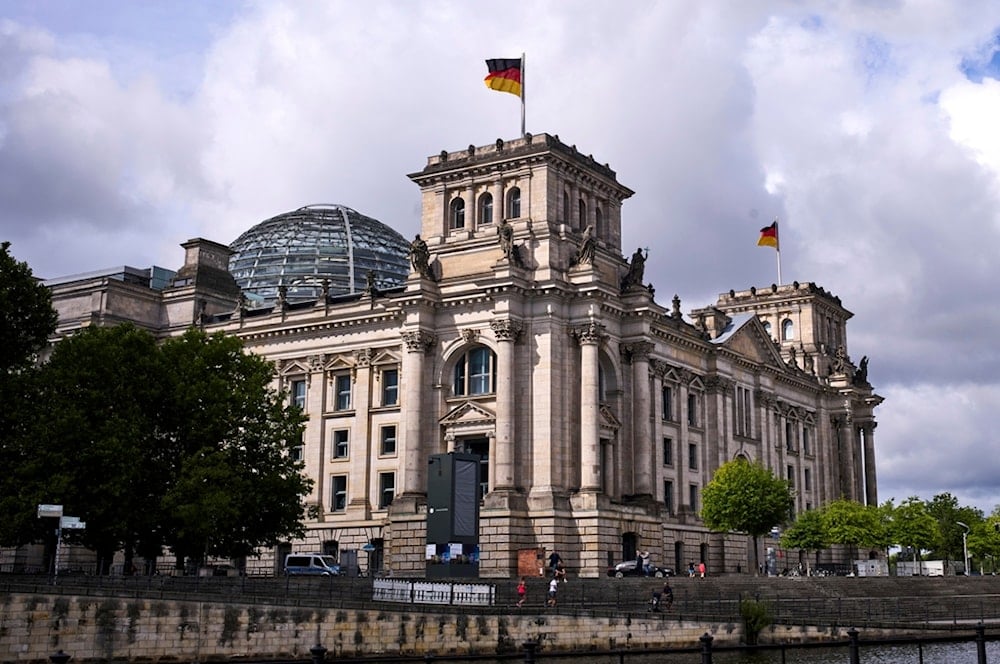Germany blocks EU push to sanction 'Israel' over war on Gaza
Germany has blocked an EU proposal to suspend "Israel's" access to Horizon Europe funding, exposing sharp divisions within the bloc as humanitarian concerns in Gaza mount and countries like France, the UK, and Canada prepare to recognize Palestinian statehood.
-

German national flags wave on top of the Reichstag Building, the house of the German parliament Bundestag during a debate about the budget 2025, in Berlin, Germany, Tuesday, July 8, 2025 (AP Photo)
Germany has moved to block a European Commission proposal that would have suspended "Israel's" access to certain EU research funds, underscoring deep divisions within the bloc over how to respond to the war on Gaza.
The Commission's plan centered on Horizon Europe, the EU's flagship research program. Brussels sought to exclude "Israel" from startup-oriented funding streams tied to drones, cybersecurity, and artificial intelligence, technologies that could bolster military capabilities. The proposal was designed as leverage to pressure Tel Aviv into easing restrictions on humanitarian aid deliveries.
Speaking on the sidelines of an EU foreign ministers' meeting in Copenhagen, German Foreign Minister Johann Wadephul dismissed the measure as ineffective. "We are not convinced that this will affect Israel's actions in Gaza," he said. Instead, Wadephul highlighted Berlin's own restrictions on certain weapons exports as a more meaningful step: "I believe this is a very targeted measure, one that is very important and very necessary."
Selective Sanctions
Germany's position carries weight. Since October 2023, Berlin has approved nearly €485 million in arms export licenses to "Israel," though it has recently suspended deliveries of equipment that could be used in Gaza. In parallel, Germany has provided more than €300 million in humanitarian aid to Palestinians, including a resumed partnership with UNRWA and a joint airlift effort with France, the UK, and Jordan.
EU foreign policy chief Kaja Kallas acknowledged that member states remain sharply divided. "I am not very optimistic that we will reach an agreement soon," she admitted, noting that the proposal requires a qualified majority rather than full unanimity.
Several governments, however, are pushing for stronger measures. Denmark, which currently holds the EU presidency, has signaled support for broader trade restrictions. Spain's Foreign Minister Jose Manuel Albares and Slovenia's Tanja Fajon have openly accused the bloc of inaction. "The EU has not imposed a single measure," Fajon told Bloomberg, contrasting the lack of sanctions on "Israel" with the bloc's quick response against Russia after the Ukraine war began.
The debate comes as condemnation of "Israel's" actions intensifies across the West. Earlier this month, over two dozen states, including France, the UK, Canada, Spain, and several Nordic countries, signed joint statements warning of catastrophic consequences in Gaza and demanding increased aid access.
At the same time, major European powers are recalibrating their policies: both the UK and France have announced plans to recognize Palestinian statehood at the UN General Assembly in September, a move framed as a direct response to the war. Canada has indicated it will follow suit.
European collective action on Gaza looks less about concern for Palestinians and more about safeguarding the West’s self-image. Analysts suggest EU leaders fear that unchecked Israeli actions erode the self-proclaimed moral superiority on which Western values and foreign policy narratives rest, exposing deep contradictions between rhetoric and reality.
Their pressure on Tel Aviv is therefore not rooted in solidarity with Palestinians, but in anxiety over how Israelis conduct themselves, which undermines Europe’s credibility, destabilizes the moral framework it projects globally, and threatens "Israel’s" own long-term stability, which Europe sees as integral to its strategic posture.
The war which began in October 2023 has since claimed over 61,000 Palestinian lives, according to Gaza's health authorities. A UN-backed panel declared earlier this month that famine is underway in northern Gaza, leaving over half a million people on the brink of starvation.
Read more: Merz faces legal firestorm as Germans demand accountability over Gaza

 4 Min Read
4 Min Read








